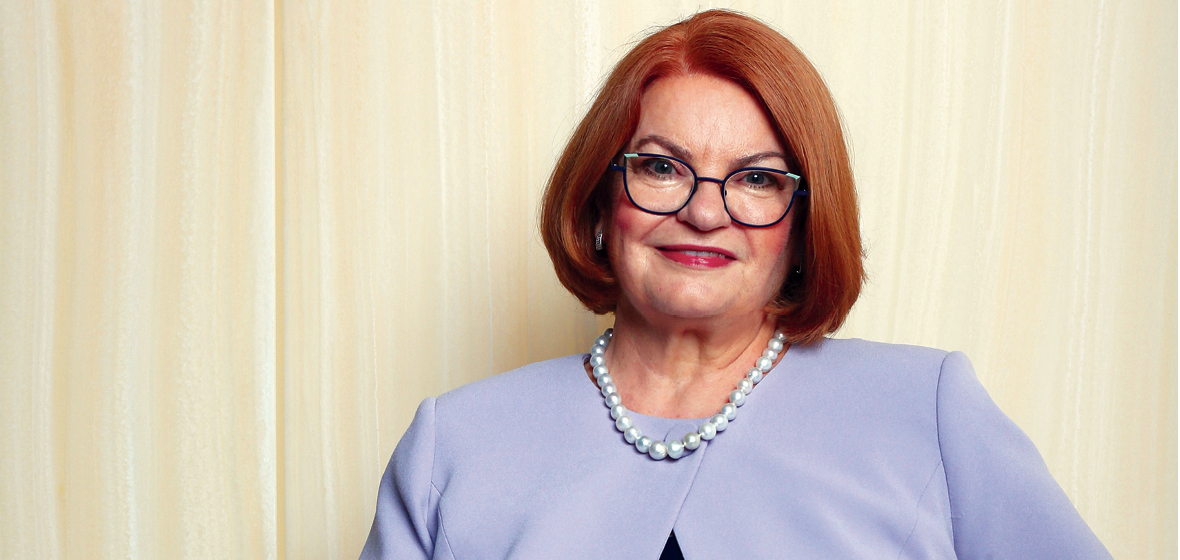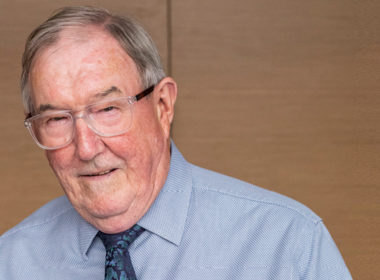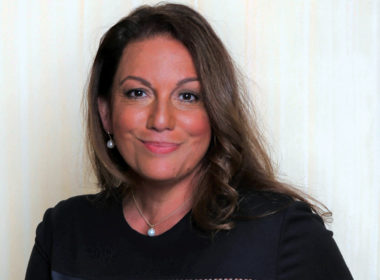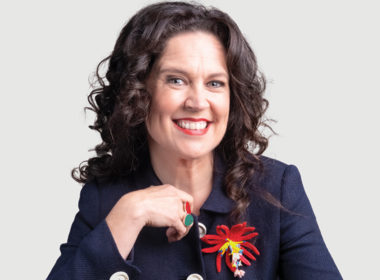The new President of the Law Society of NSW shares her goals for 2021 over lunch.
Early in Juliana Warner’s legal career, a wise person – she can’t quite remember who – passed her the most important piece of advice she would ever receive. It was a Japanese proverb that said, “Fall down seven times, get up eight.”
Regardless of who said it or where she read it, the mantra has served Warner well during a career spanning more than 30 years as a litigator in complex and varied disputes. Since graduating with a Bachelor of Arts/Law from the University of NSW in the 1980s, Warner has led myriad high-profile cases to trial, launched appeals all the way to the High Court, defended AUSTRAC investigations, traded blows with the Australian Competition and Consumer Commission (ACCC), and acted in the Royal Commission into Aged Care Quality and Safety. She remained loyal throughout to Big Six law firm Herbert Smith Freehills (HSF), spending 26 years as a partner in the Sydney office, and the past eight as Sydney Managing Partner.
“It’s still the best advice I’ve ever received,” she tells LSJ over lunch in January, the first month of a 12-month leave of absence she has taken from HSF to free herself up for new responsibilities as 2021 President of the Law Society of NSW.
“It’s all about being able to cope with setbacks, which is incredibly important in a professional life. Because things don’t always go to plan, and you must be able to recover when that happens. And you have to have the kind of character where you can be gracious about things not going to plan.”
We are dining al fresco at Da Capo Courtyard Café in the Sydney Eye Hospital precinct – a breezy sun trap on the eastern flank of the CBD where lawyers find respite from the icy wind tunnels of Phillip Street.
The President’s advice on resilience is timely in the wake of one of the most challenging years for the legal profession in recent history. The 2020 COVID-19-induced recession saw the Australian economy take its steepest plunge on record – a dive in gross domestic product (GDP) of 7 per cent in the June quarter. It was the first downturn in almost three decades. Helping the profession bounce back from the pandemic is the first thing she has set her sights on as President.
“Last year was quite a blow. I think a lot of people have found some areas of business have dropped off, and some areas have become busier,” she says.
As President, I want … to take the best of the pandemic experience and capitalise on it for the benefit of those in the legal profession and the clients we serve.
Warner was part of the Law Society Council that reduced Law Society membership fees to just $10 last year to reduce financial pressure on members during the initial phases of the pandemic; a one-off measure that drew widespread appreciation from the profession.
The year 2020 also presented a steep technological learning curve for lawyers. In the space of just a few weeks – two days, for Warner’s team – firms moved their entire teams from city offices to working from home and were forced to transition all work, meetings, and court cases to the online world. For litigators, “appearing” in court suddenly meant appearing on a webcam from a kitchen or dining room table, with all the tech issues and personal mishaps it can involve. As a self-professed “technological Typhoid Mary” (“everything I touch seems to stop working!” she tells me as we trot across Macquarie Street on our way to lunch), Warner had her share of mishaps but also lightbulb moments.
“As President, I want to capture those innovative practices that worked during the pandemic and share this with the wider profession,” she says.
“The plan is to take the best of the pandemic experience and capitalise on it for the benefit of those in the legal profession and the clients we serve.”
Like many lawyers, Warner discovered efficiencies in working from home. Less time spent commuting to her Sydney office meant more time for hobbies like walking, cooking, or taking joy in the birth of her new grandchild.
It also gave her time to reflect on what legacy she would like to leave as President in 2021. Part of that legacy will be fundraising for a charity that is close to her heart: she has nominated the Dementia Australia Research Foundation as the 2021 President’s charity.
“I chose it because Mum passed away after suffering early-onset Alzheimer’s,” Warner says. “It was a horrible journey for my family. Alzheimer’s is just such an appalling disease and it affects the family of sufferers as well as the sufferer. It takes away the very thing that enables people to come to terms with a terminal illness. My passion for this was reinforced by my work on the aged care royal commission.”
Aside from charity work, Warner has a considerable list of goals for the Law Society’s thought leadership and policy agendas in 2021. (“I’m going to be busy!” she laughs.)
She wants to broach the difficult and evolving issue of climate change law, enhance diversity and disability in the profession, and raise the profile of the profession in the broader community. She also mentions she is interested in the Black Lives Matter movement, and its parallels to all forms of diversity. Diversity and inclusion is something she is passionate about, having started her career when the legal profession was still mostly dominated by men.
“I was the first woman lawyer at Freehills to work part time,” she says, reflecting on the years when she juggled two young daughters with her fast-paced career in litigation. “Because [people said] how can you work at a commercial law firm part time? What would clients think?
“Most people believed that if you had babies it meant you were not committed in your career. In those days, you couldn’t be a partner and work part time – that was nonsensical. Now there are partners being promoted part time everywhere. It’s no big deal at all.”
Warner helped to establish the Law Society’s Diversity and Inclusion Committee in 2017 and was the first chair of its 21 members. She was instrumental in developing the profession’s Charter for the Advancement of Women, which more than 100 legal workplaces have signed and committed to, but she says there is plenty more for the legal profession to achieve on a range of diversity fronts.
“We need our institutions to reflect our society. That’s not just a matter of gender or colour – it’s about a range of diversity measures, getting more people from different backgrounds on courts, represented in professions and represented as leaders in our profession.”





